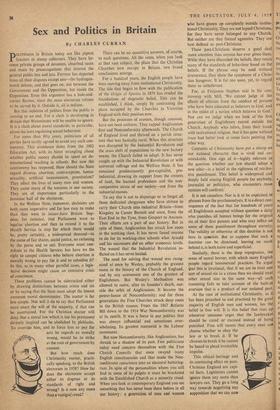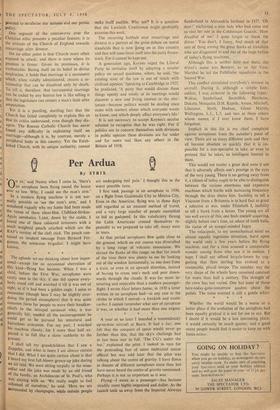Sex and Politics in Britain
By CHARLES CURRAN pOLITICIANS in Britain today are like pigeon fanciers or stamp collectors. They have be- come private groups of devotees, absorbed more and more by preoccupations that interest the general public less and less. Fervour has departed from all their disputes except one—the hydrogen- bomb debate; and that goes on, not between the Government and the Opposition, but inside the Opposition. Even this argument has a hole-and- corner flavour, since the mass electorate refuses to be stirred by it. Outside it, all is tedium.
But this isolation of politics from the public is coming to an end. For a clash is developing in Britain that Westminster will be unable to ignore. It is a clash about moral standards; in particular, about the laws regulating sexual behaviour.
For more than fifty years, politicians of all parties have tacitly agreed to avoid any such con- troversy. This avoidance dates from the 1902 Education Act, with its bitter wrangling about whether public money should be spent on de- nominational teaching in schools. But now the controversy has reopened. How should the State regard divorce, abortion, contraception, homo- sexuality, artificial insemination, prostitution? They affect the lives of many men and women. They cause many of the tensions in our society. They are of importance particularly to the feminine half of the electorate.
In the Welfare State, moreover, decisions are both more imperative and far less easy to make than they were in laisser-faire Britain. Sup- pose, for instance, that Parliament were to legalise abortion and then to extend it to the Health Service (a step for which there would be, pretty certainly, a widespread demand—in the name of fair shares, social justice, no rationing by the purse and so on). Everyone must con- tribute to the Health Service; but have we the right to compel citizens who believe abortion is morally wrong to pay for it and to subsidise it? In this, as in many other parallel cases, a legis- lative decision might cause an extensive crisis of conscience.
These problems cannot be sidetracked either by drawing distinctions between crime and sin or by saying that the State must adopt the lowest common moral denominator. The matter is far less simple. Nor will it do to say that Parliament must enact the will of the majority, if that can be ascertained. For the Christian elector will deny that a moral law which is (on his premisses) divinely inspired can be abolished by plebiscite. To override him, and to force him to pay for acts he regards as morally wrong, would be to strike at the root of government by consent.
But how much does Christianity matter, practi- cally speaking, to the British electorate in 1958? How far does the electorate accept either its dogmas or its standards of right and wrong? Is it now any more than a vestigial creed? There can be no quantitive answers, of course, to such questions. All the same, when you look at that vast subject, the place that the Christian Churches now occupy in Britain, two broad conclusions emerge.
For a hundred years, the English people have been moving away from institutional Christianity. The tide that began to flow with the publication of the Origin of Species in 1859 has eroded the foundations of dogmatic belief. This can be established, I think, simply by contrasting the place occupied by the Churches in Victorian England with their position now.
But the processes of erosion, though constant, have not been uniform. They sapped Anglicanism first and Nonconformity afterwards. The Church of England lived and thrived on a parish struc- ture that was basically rural. When this structure was disrupted by the Industrial Revolution and the mass shift of populations to the new factory towns, the Church failed to adapt. It has never caught up with the Industrial Revolution or with universal suffrage and the Welfare State. It has remained predominantly pre-capitalist, pre- industrial, drawing its support from the owners of land, the learned professions and the non- competitive strata of our society—not from the industrial masses.
To say this is not to disparage or to forget all those dedicated clergymen who have striven to carry their Church into industrial Britain—from Kingsley to Canon Barnett and since, from the East End to the Tyne, from Gosport to Ancoats. Their efforts are a part of our history. But in spite of them, Anglicanism has struck few roots in the working class. It has never found anyone to do for its working-class schools what Arnold and his successors did on other economic levels. The wound that the Industrial Revolution in- flicted on it has never healed. , The need for salving that wound was recog- nised at once by Wesley, probably the greatest name in the history of the Church of England, and by any assessment one of the greatest of Englishmen. But Wesley's Methodism was allowed to move, after its founder's death, out- side the orbit of Anglicanism. It became the power-house of Nonconformity; and for three generations the Free Churches struck deep roots in the British masses. From the 1867 Reform Bill down to the 1914 War Nonconformity was at its zenith. It was a force in our politics that was always influential and sometimes over- whelming. Its greatest memorial is the Labour movement.
But now Nonconformity, like Anglicanism, has shrunk to a shadow of its past. Few, politicians today need concern themselves with the Free Church Councils that once swayed many English constituencies and that made the Non- conformist conscience into an electoral battering- ram. In spite of the personalities whom you still find in some of its pulpits it must be bracketed with the Established Church as a minority creed. When you look at contemporary England you see something that has never been there before in all our history : a generation of men and women who have grown up completely outside institu- tional Christianity. They are not lapsed Christians, 3 for they have never belonged to any Church. But neither are they formal agnostics. They are best defined as post-Christians.
These post-Christians deserve a good deal more attention than anyone has ever given them. While they have discarded the beliefs, they retain many of the standards of behaviour based on the beliefs. If the phrase may be used without irreverence, they show the symptoms of a Chris- tian hangover. It is far too soon, yet, to regard them as unbelievers.
For, as Fitzjames Stephen said in his con- troversy with Mill, 'We cannot judge of the effects of atheism from the conduct of persons who have been educated as believers in God, and in the midst of a nation which believes in God.' Nor can we judge when we look at the first generation of Englishmen reared outside the Church. Anybody who infers, from their break with institutional religion, that it has gone without trace had better look at some facts pointing the other way.
Centuries of Christianity have put a stamp on our national character that is vivid and un- mistakable. One sign of it—highly relevant to the question whether our law should adopt a new ethic—is a belief in the rightness of retribu- tive punishment. This belief is widespread and deeply held among English people (as anybody, 1 journalist or politician, who encounters mass opinion will confirm).
It is not causeless. Nor is it to be explained in phrases from the psychoanalysts. It is a direct con- sequence of the fact that for hundreds of years all Englishmen accepted without question a deity who punishes all human beings for the original sin of their first parents and who may inflict on some of them punishment throughout eternity. The validity or otherwise of this doctrine is not here in question. But to suppose that such a doctrine can be dismissed, leaving no mark behind it, is both naive and superficial.
Similarly, there is the deep repugnance, the sense of moral horror, with which many English people regard homosexual practices. To argue that this is irrational, that if we are to treat one sort of sexual sin as a crime then we should treat other sexual sins in the same way—all such reasoning fails to take account of the built-in aversion that is a product of our national past.
At the root of institutional Christianity, as it has been preached to and practised by the great majority of English men and women, lies the belief in free will. It is this belief that rises up whenever someone urges that the lawbreaker should be cured or excused instead of being punished. Free will means that every man can choose whether to obey the law or to break it. If he chooses to break it he cannot be heard to plead irresistible impulse.
vv la
lii al
C' th
fc tri
l's
This ethical.heritage and its continuing effect on post- Christian England are capi- tal facts. Legislators cannot ignore them any more than lawyers can. They go a long way towards negativing any supposition that we can now Proceed to secularise our statutes and our public Policy.
One segment of the controversy over the Christian ethic presents a peculiar feature; it is the attitude of the Church of England towards remarriage after divorce.
On no other point is that Church more often exposed to attack; and there is none where its position is firmer. Given its premisses, it is irrebuttable. Basing itself on its belief in divine inspiration, it holds that marriage is a sacrament Which, when validly administered, creates a re- lationship that can be dissolved only by death. To tell it, therefore, that sacramental marriage can be ended by any human law is like telling it that the legislature can restore a man's limb after amputation.
Yet it is a puzzling, startling fact that the Church has failed completely to explain this so that its critics understand, even though they dis- agree. The Roman Catholic Church has never found any difficulty in explaining itself on marriage—although it is, by contrast, merely a Peripheral body in this country. Yet the Estab- lished Church, with its unique authority, cannot make itself audible. Why not? It is a question that the Lambeth Conference might profitably examine this week.
The recurring hubbub over remarriage and divorce is a portent of the great debate on moral standards that is now going on in this country and that will soon force itself into the party frame- work. For it cannot be kept out.
A generation ago, Keynes urged the Liberal Party to revitalise itself by adopting a secular policy on sexual questions, where, he said, 'the existing state of the law is out of touch with civilised opinion.' Speaking at Cambridge in 1925, he predicted, 'A party that would discuss these things openly and wisely at its meetings would discover a new and living interest in the elec- torate—because politics would be dealing once more with matters about which everyone wants to know, and which deeply affect everyone's life.'
It is not necessary to accept Keynes's secular solution to recognise that he was right. For if politics are to concern themselves with divisions in public opinion these divisions are far wider and far more real than any others in the Britain of 1958.























































 Previous page
Previous page